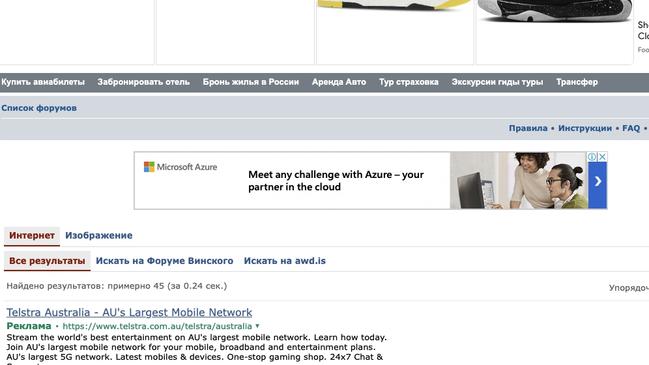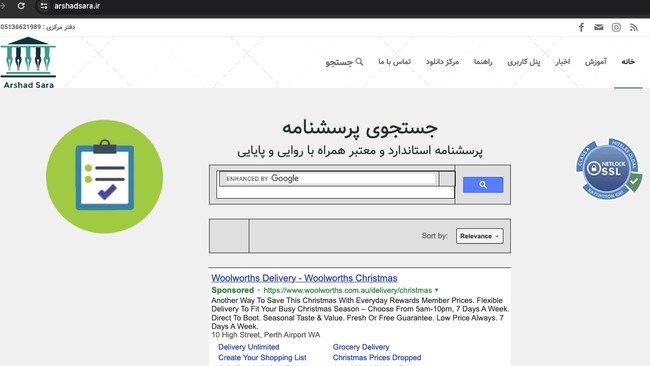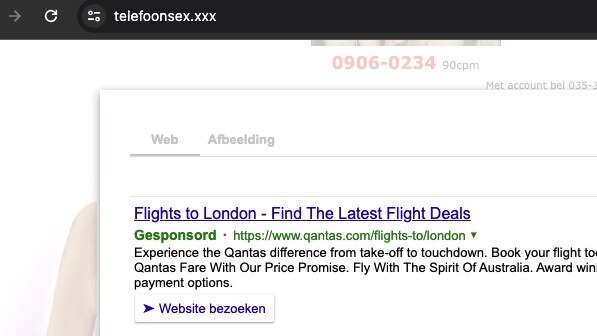Google accused of flouting Russian, Iranian trade sanctions with Australian companies ads
Australian companies such as NAB, Qantas and Telstra have inadvertently placed ads on Russian, Iranian and pornographic websites via Google, a report by US-based Adalytics says.

Business
Don't miss out on the headlines from Business. Followed categories will be added to My News.
Telstra and Qantas have halted marketing on Google after their advertisements appeared on Russian, Iranian and pornographic websites - potentially breaching trade sanctions and causing reputational harm.
US-based ad tech company Adalytics found scores of businesses and government agencies – including the US Federal Bureau of Investigation and US Treasury – have had advertisements appear on a range of compromising websites.
The revelations are a shock to most companies and entities, which have trusted Google’s Search Partners program to ensure their advertisements comply with various laws and international sanctions.
Qantas and Telstra responded immediately, temporarily disabling Google Search Partners as they sought answers from the tech behemoth.
“We have temporarily paused the Google Search Partner program until we are able to discuss this further with Google and understand how this has occurred,” a Telstra spokesman said.
Adalytics founder and chief executive Krzysztof Franaszek said advertisements from NAB, Woolworths and Atlassian had also appeared on the compromising sites via Google. He estimated the scale of the problem to be up to $US11bn ($16.53bn) a year. This was based on Google’s search advertising revenue totalling $US162.45bn last year, according to Statistica.
“If one were to simplistically assume that this sample is representative of the larger Google search ad ecosystem … one could estimate that $US11 billion in search ad campaign spend was allocated to Search Partners or Display Expansion for Search ad campaigns,” the Adalytics report said.
In a statement, Google said it would review the report, but accused Adalytics of previously making “exaggerated claims”.
Google Search Partners allows publishers to run custom searches on their websites. NAB, Qantas, Woolworths, Telstra and Atlassian’s advertisements appeared on these searches on Iranian website Arshad Sara.

The Australian government reimposed targeted financial sanctions and travel bans on 19 Iranian individuals and 57 entities last month, accusing Tehran of failing to uphold its non-proliferation obligations.
Advertisements have also appeared on Russian and hardcore pornographic websites.
“Google has created a new ad targeting algorithm called “Performance Max” or “pmax”. According to Google’s documentation, Performance Max “combines Google’s AI technologies” and “audiences” and “audience signals”,” Adalytics said.
“Advertisers have told Adalytics that they do not receive detailed placement reports on where ads are served on Google Search Partners when they run Performance Max campaigns. Furthermore, advertisers have reported they do not appear to know of a way to opt out of Search Partners when using Performance Max.”
Dutch politician and European parliament member Paul Tang said it was “the first time in history we face the unsettling reality of AI committing crimes”, according to a statement in the Adalytics report.
Google vice-president of global ads Dan Taylor said: “We’ll of course review the report, but our analysis of the sites and limited information already shared with us did not identify ad revenue being shared with a single sanctioned entity.
“The examples shared are from our Programmable Search Engine (ProSE) product (a minuscule part of our Search Partner Network), which is a free search tool we offer to small websites so that they can present a search experience directly on their sites.
“Ads may appear based on the user’s specific search query; they are not targeted to, or based on, the website they appear on. Websites who merely implement ProSE do not get any ad revenue from those ads.
“Adalytics’ revenue implications related to small sites like the examples we’ve reviewed are, frankly, absurd.”

The Adalytics report quoted “multiple Fortune 500 and government brands” saying that “even if they were not billed for search ad impressions served on a given search partner’s website – due to the ads not having been clicked by a consumer – the brands would still like to avoid having their ads served adjacent to pornographic or animal abuse content”.
Joshua Lowcock – an Australian New York-based advertising executive who is now president at marketing agency Quad – called for greater regulation of the global advertising industry to ensure more transparency.
“This is an industry-wide problem, where there is a lack of diligence by ad tech vendors with their “publisher partners” and where advertisers are opted into opaque and non-disclosed inventory, often by default,” Mr Lowcock told The Australian.
“This is not unique to Google. This is able to occur because there is a lack of regulatory oversight of the billion-dollar advertising industry and too much trust placed in the advertising ecosystem, in automation and AI, and an underinvestment in checks and balances that drive transparency.”

But Mr Lowcock said businesses could take steps to protect themselves.
“(They can) invest in tools that have the capability to analyse search performance for fraudulent behaviour and that can do forensic analysis of their media log file data,” he said.
“They can also work with agencies that demand and expect these tools to be used.”
A NAB spokeswoman said: “Protecting the integrity of the NAB brand is important to us.
“We continually work with our agency partners and the media outlets who publish our advertising to ensure the integrity of our brand and where there are issues we will address them.”
In June, Adalytics published a report which said about 80 per cent of Google’s video-ad placements on third-party sites violated promised standards, raising questions about the transparency of the tech behemoth’s online-ad business. Google rejected those claims.
Originally published as Google accused of flouting Russian, Iranian trade sanctions with Australian companies ads



